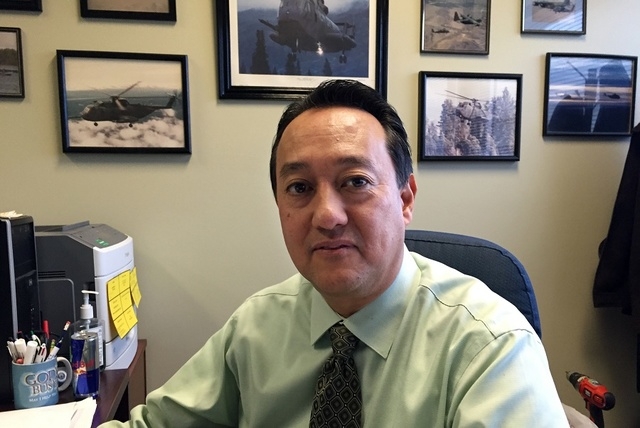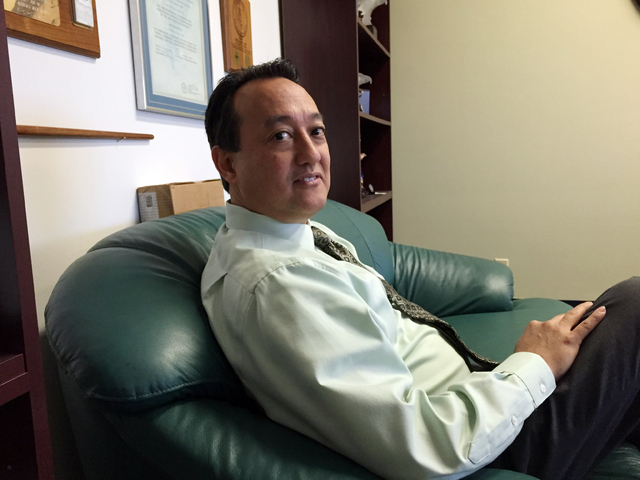Creech joins Air Force higher education program
With high-tech aircraft and command of cyberspace, they excel in fighting the global war on terrorism.
While those assets at Nellis and Creech Air Force bases are widely known, seldom does their prowess on the higher education front receive as much publicity.
As part of the Community College of the Air Force, through what’s known as “Air University,” the bases graduate hundreds of airmen with associate’s degrees in applied science and other course work.
Some of their academic success revolves around the work at the bases. Nellis trains fighter pilots and tests the war-fighting capabilities of the latest stealth aircraft, the F-35 joint strike fighter jets and the F-22 Raptors.
Creech is a hub for remotely piloted or drone aircraft. From ground stations at Creech and elsewhere in the United States, pilots and sensor operators sit at computer consoles and fire laser-guided missiles, or bombs in the case of the Reapers, to knock out targets.
While Nellis has been in the education business for years, Creech, 45 miles northwest of Las Vegas at Indian Springs, held its first Community College of the Air Force graduation ceremony Nov. 14, with 109 graduates earning associate of applied science degrees.
The Community College of the Air Force was launched in 1976. It has more than 250,000 students and offers 2,000 courses, ranging from air and space operations technology to cybersecurity, criminal justice, mass communications, meteorology and survival instruction.
William C. Ide is chief of education and training at the Nellis and Creech bases.
“When a student recruits into the Air Force, whether they like it or not, they are picked to do a specific job. Then they go to boot camp and tech school. There, a degree is established and they start accumulating hours. Those credit hours are applied to their Community College of the Air Force degrees,” Ide said.
“That is exactly why we have huge numbers of graduates, or enlisted members getting their associate’s degree, because we have an avenue for them to do that right off the get-go.”
Last year, 682 students from the two bases graduated from the Community College of the Air Force, up from 520 in 2013.
Ide oversees some $2.2 million dispersed to nearly 1,665 airmen at Nellis and Creech through the Air Force’s Military Tuition Assistance Program to pursue associate degrees from the Community College of the Air Force, or bachelor’s and even master’s degrees. With some taking two or three classes, they are enrolled in roughly 3,000 classes.
Under the program, the Air Force can provide up to $4,500 per year for a student to go to school with a maximum expenditure of $250 per semester-hour.
“They are not limited to that,” he said. “If they choose to request federal student aid, they can do that as well, or perhaps even the G.I. Bill; so there is a number of different funding options. But preferably we want them to use the military tuition assistance because, frankly, it’s free money.”
Even with the Department of Defense tightening budgets to avoid mandated cutbacks under the sequester law, Air Force leaders decided not to reduce the amount of tuition assistance. Instead, they instituted many restrictions on how it is used. For example, to access the funds beginning last year airmen had to be in good standing with the military, which means they couldn’t be on controlled rosters for misbehavior and they couldn’t have flunked physical training tests.
Grade-point averages also came into play, Ide said. “You had to have 2.0 or higher. If you didn’t you couldn’t take advantage of military tuition assistance. So they kind of clamped down a little bit, and that’s how they control expenses.”
Community College of the Air Force students must complete 64 credits, of which 15 are for general education subjects such as speech, math, English, social science and humanities. Another 15 credits are electives; six are in management, and the rest are in technical education associated with their job training.
Some students can take classes at the University of Nevada, Las Vegas or the College of Southern Nevada. Many degrees are completed online because the nature of military jobs means recruits could be deployed, required to participate in exercises or face shift changes.
Because an airman’s technical education is job specific, it is difficult to transfer credits to a civilian college.
Nevertheless, Ide said, “There are many, many, many military friendly schools that have already analyzed and evaluated those credits and will accept them. Some schools are really strict about it. They won’t take anything. Some schools will take them all.”
The Community College of the Air Force is part of Air University at Maxwell Air Force Base, Ala. Air University includes branch colleges and institutions specific to the Air Force, such as the Air Force Institute of Technology, Squadron Officer School and the Air War College.
Those are accredited by the Southern Association of Colleges and Schools, “the gold stone of accrediting bodies,” Ide said.
“I tell students that when you go for a job interview, there are two things an employer looks for. One is competency; they want to make sure you have the competency to do the job. And the other is they want to make sure you’re not going to be a virus that comes into the organization and disrupts it.
“Competency is based on your experiences, your training and your education. So we tell students you want to stack those cards on your side.”
Contact Keith Rogers at krogers@reviewjournal.com or 702-383-0308. Find him on Twitter: @KeithRogers2.





























